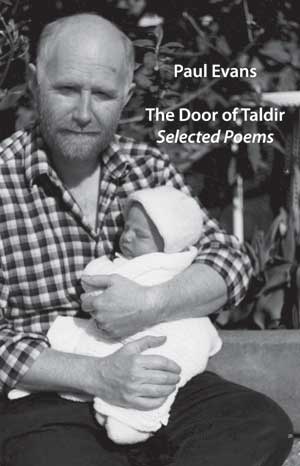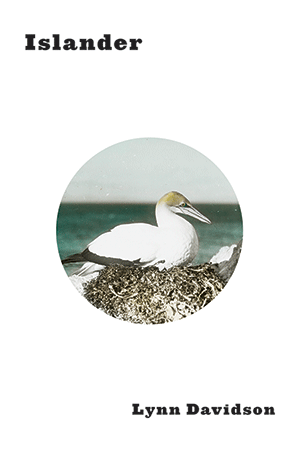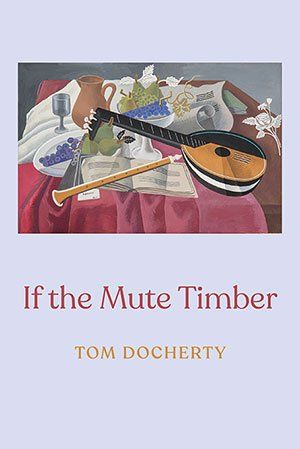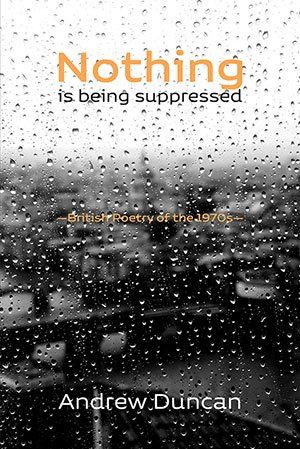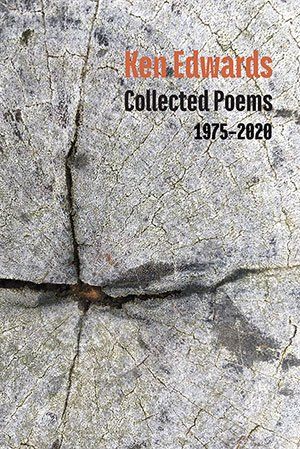Ian Davidson At a Stretch
Published 2004. Paperback, 9x6ins, 109pp, £12.95 / $20
ISBN 9780907562443
The author's second full-scale collection, following a series of fine chapbooks, and his largest collection so far. Ian Davidson is one of the most exciting and innovative English-language poets currently writing in Wales, and his radical engagement with landscape in these poems offers new ways of using and approaching landscape within the context of a poem.
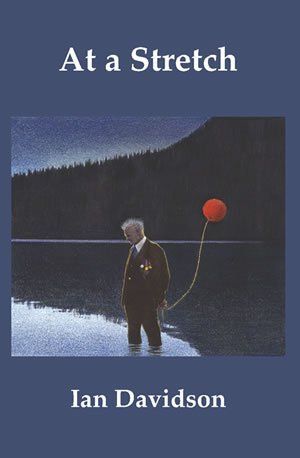
Ian Davidson As if Only
Published 2007. Paperback, 9x6ins, 84pp, £10.95 / $18
ISBN 9781905700080 [Download a sample PDF from this book here .]
The author's second Shearsman collection, following his successful first large collection, At a Stretch (2004). The author says of this book: "These poems were written in Bangor, in north Wales, in Barcelona, in London, on the Baltic coast and in Fez and Marrakech. Despite the distances involved they are the result of a period of introspection and self-possession. Travel doesn't necessarily broaden the mind. In some cases only the long lines would do, and the language had to be chewed over, while in others, when the town was quiet and the blood had stopped pounding in my head, I could clip the tone and measure out the words a few at a time."
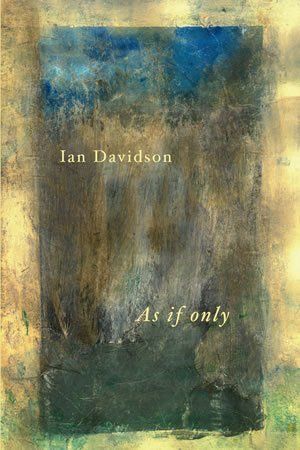
Ian Davidson Partly in Riga and Other Poems
Published 2010. Paperback, 108pp, 9x6ins, £12.95 / $20
ISBN 9781848611306 [Download a sample PDF from this bookhere.]
Partly in Riga and other poems is a book in five sections, covering themes of birth (the arrival of a new son), travel in Latvia, in Greece and in Wales, contemporary politics, and the endless of vagaries and mysteries of people. "I like people, though they disturb me sometimes." (Ian Davidson, from the Foreword)
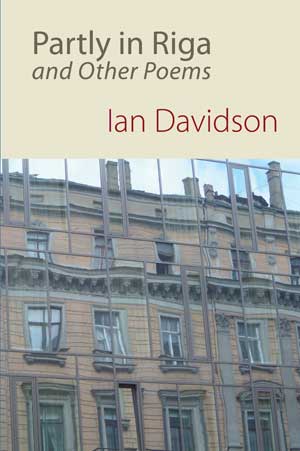
Ian Davidson On the Way to Work
Published 2017. Paperback, 30pp, 8.5 x 5.5ins £7.50 / $10.95
ISBN 9781848615625 [Download a sample PDF from this book here .]
These poems were written on the way to work, walking the two and a half miles from near Saltwell Park in Gateshead to Northumbria University in Newcastle. The journey took me through Gateshead’s residential streets, its town centre and over the Tyne, often by the High Level Bridge. I’d try to write something in my head every day before I got to work, while still free of the numbing rush of its demands. Sometimes a whole poem would appear, at other times one or two words or lines would shift and repeat through seemingly endless variations, refusing to settle.

Ian Davidson New and Selected Poems
Published 2022. Paperback, 106pp, 9x6ins, £12.95 / $20
ISBN 9781848618268 [Download a sample PDF from this book here .]
The poems in this selection range from recent poetry written in Ian Davidson’s new home in Ireland (in ‘Coming and Going’) to work gathered from his collections with Shearsman and Spectacular Diseases, written when he lived in north Wales. This volume also makes available long out-of-print sequences from West House, Oystercatcher and Wild Honey, work that was published to some critical acclaim and was described at the time of its publication as ‘some of the most exciting and innovative poetry currently being written in Wales’. Combining human and non-human concerns, the social and the environmental, the poems chart a growing interest in the ways the landscape and the moving body interact. They focus on events such as an archaeological dig off the west coast of Ynys Môn, on a walk around the Llŷn peninsula and exploring the coast at Aberystwyth, but never lose sight of the gritty politics of language in those communities or the ways the frictions of mobility are part of the writing process.
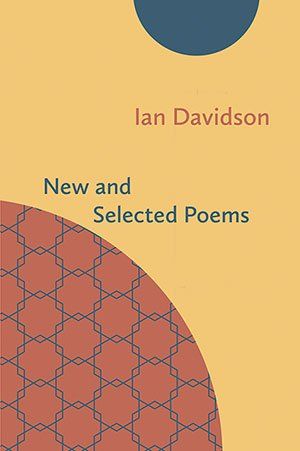
Lynn Davidson Islander
Patricia Debney Littoral
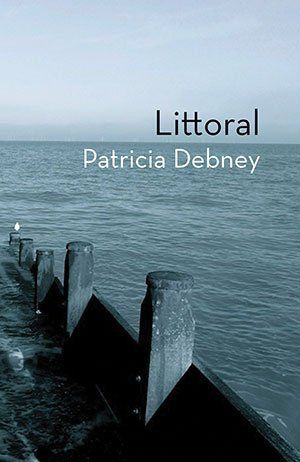
Patricia Debney Gestation
Published 2014. Chapbook, 36pp, 8.5x5.5ins, £7.50 / $10.95
ISBN 9781848613669 [Download a sample PDF from this book here .]
Patricia Debney’s first collection of prose poems, How to Be a Dragonfly (Smith Doorstop Books, 2005), was the overall winner of the 2004 Poetry Business Book & Pamphlet Competition. A novel, Losing You (bluechrome) appeared in 2007. Her second collection of prose poems, Littoral , was published by Shearsman Books in 2013. She is a Senior Lecturer in Creative Writing at the University of Kent.
Exploring fragmentation, delusion and parental ageing, the long poem Gestation forms part of her next collection, Baby.
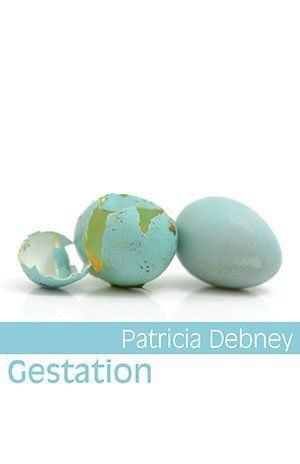
Peter Dent Handmade Equations
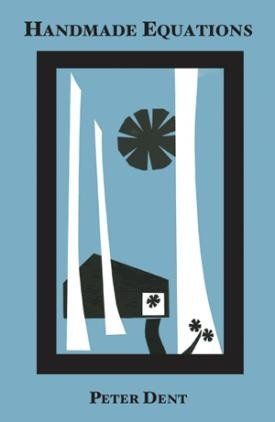
Peter Dent Tripping Daylight
Published 2012. Paperback, 112pp, 8.5x5.5ins, £12.95 / $20
ISBN 9781848612341 [Download a sample PDF from this book here .]
One might be looking at a game of consequences with serially switched pronouns … or a stranger-than-life biography where missed moves and alternatives compete with the actualité for attention. Nothing here, however, is blessed by what is commonly understood as 'finality', realised or imagined. Tripping Daylight , Peter Dent's latest collection, finds its unlikely protagonist connecting (or attempting to connect) the experiences of a 'life lived' with a welter of convenient 'truths'—known or suspected—and which may be seen as arguable every step of the way. Shared words and wisdom, occasioned by this singular work, allow both for the making of an expansive public field and the leaving of private tracks.
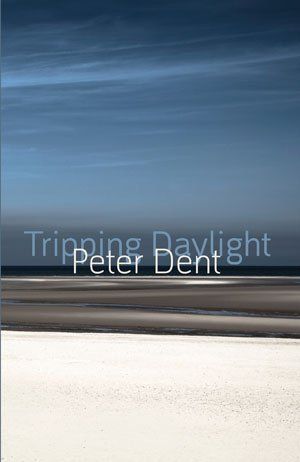
Peter Dent A Wind-Up Collider
Published 2019. Paperback, 108pp, 8.5 x 5.5ins, £12.95 / $20
ISBN 9781848616660 [Download a sample PDF from this book here .]
Like any self-respecting cloud the words of this, Dent’s latest volume, have occasion to slip into and out of focus as well as flit between meanings. To recognise such moments is to ensure we are party to an intrigue more about delight and imagination than dissecting (or, heaven help us, directing) a life. An eye for the weather (physical/mental) is a cannier companion here than any Baedeker or mind that frets. To be fully present within the action of the text is to see that what we’d first interpreted as ‘the finishing line’ was, shockingly, ‘birds migrating’. The mind is vulnerable, matter is contrary, life is in a state of flux. ‘Skip all that tosh about modelling clouds: for every big storm / or soul in torment, I’ve a shedful of u/s machinery.’ This resourceful and energetic new collection acknowledges not just the world we (think we) know but the many and various others. Being here, being reactive to ‘all that is’, is key.
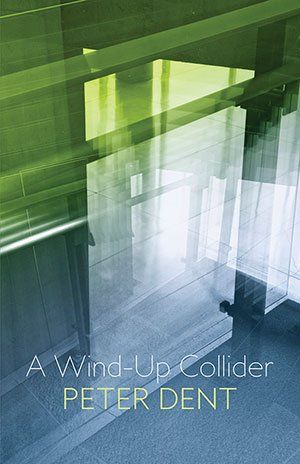
Mark Dickinson Tender Geometries
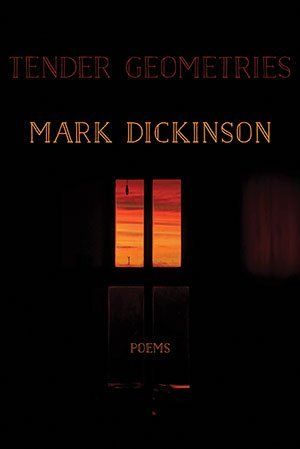
Mark Dickinson Networks
“In this brilliant collection, Mark Dickinson ranges – with a passionate, weary restlessness – over bird, plant, monetary, sexual, and internet networks, but mocks any easy connection between these. His tone varies from lovingly intimate to bitingly witty, picking up language from taxonomic systems, social media, travel and nature writing, but all the while retaining a lyric intensity and sense of dynamic, layered, threatened living spaces. We feel, powerfully, the search for values we might live by, but the work demonstrates again and again that this is hard to come by: ‘Gathering a sense of love from a hole of black earth is dark dark, & everything is leaving’.” —Harriet Tarlo
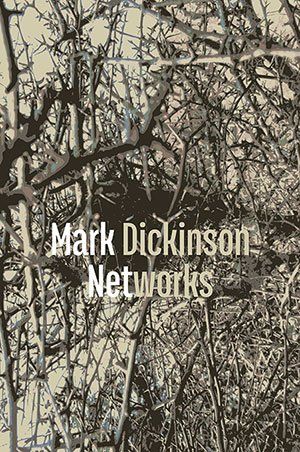
Tom Docherty If the Mute Timber
Published 2022. Paperback, 94pp, 9 x 6ins, £10.95 / $18
ISBN 9781848618091 [Download a sample PDF from this book here .]
Tom Docherty’s first collection,
If the Mute Timber , begins ‘not with a book / nor even an attentive ear’, but with the elusive fragment of its title. The poems situate themselves
in medias res : among birds or gravestones, between lines of prayer, in the flux of appearances. Places without words become focal points: the poems seek articulation in life before birth and after death; in animal and imagined lives; in works of music, painting, and architecture; and in the varied silences of human and divine relationships. In one sense, the poems are variations on the
vanitas – but the transience of life and its artefacts is transposed to an offering, a potential key in which to register the work. When followed to their natural end, fragments become sentences, notes are sung.
John Donne Poems (1633)

Nikolai Duffy Relative Strangeness: Reading Rosmarie Waldrop
Published 2013. Paperback, 190pp, 9x6ins, £14.95 / $23
ISBN 9781848612778 [Download a sample PDF from this book here .]
"A sequence of fragments seems the most appropriate form for a work of this kind, introductory, surveying, essentially personal, marked, as with all things, by my own reading and preoccupations. 'Maybe,' Waldrop writes, 'the essence of the fragment is that it cuts out explanation, an essential act of poetry.' It constitutes, Waldrop continues, a 'lessening of distinctness, of "identity."' I do not claim to be comprehensive. Nor do I mean to speak for Waldrop or her work but simply to speak about some of its aspects, its various senses of poetics, the shifting relationships between theory and practice, to draw out a number of examples and to trace certain lines of thinking, ways of thinking." —Nikolai Duffy
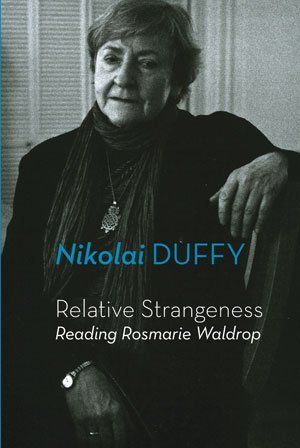
Andrew Duncan Switching and Main Exchange
Published 2000. A5 Paperback, 62pp, £7.50
ISBN 9780907562276
This collection consists of the second half of the author's Threads of Iron manuscript, subject of much discussion since its partial appearance in magazines in the early 1980s. The first half of Threads was collected in 1990 as Cut Memories and False Commands (Reality Studios, London).
See below for the complete Threads of Iron —now available as one complete volume from Shearsman Books.
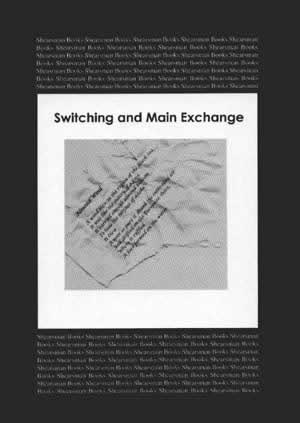
Andrew Duncan: Pauper Estate
Published 2000. A5 Paperback, 52pp, £7.50
ISBN 9780907562283
A collection of the author's poems dating from the late 1990s.
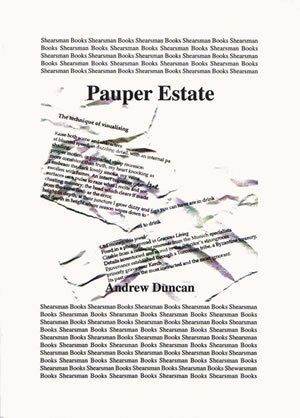
Andrew Duncan Savage Survivals amid modern suavity
Published 2006. 8.5x5.5ins, 116pp, £12.95 / $20
ISBN 9781905700035 [Download a sample PDF from this book here .]
Here are arcane mysteries, here are forgotten histories; here are assorted arcana and incunabula; and here there is a transposition of a Chinese classic to contemporary Glasgow, filtered through the mesh of a Chinese martial-arts movie. And what connects aerial photography, growing up in the Turkic lands, and sound-poetry (the difficulties of)?—Andrew Duncan's imagination, which ranges far and wide, but always brings back news of interesting climes, and landhaps even the poets' heads do grow beneath their shoulders.
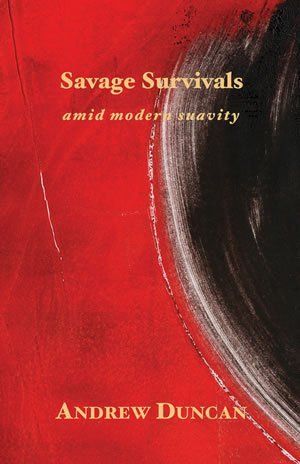
Andrew Duncan Threads of Iron
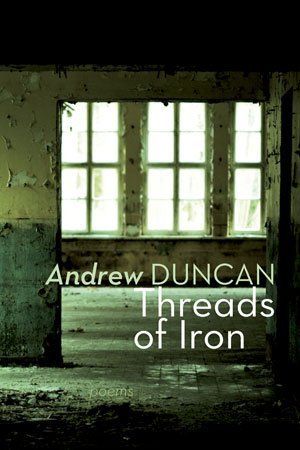
Andrew Duncan In Five Eyes
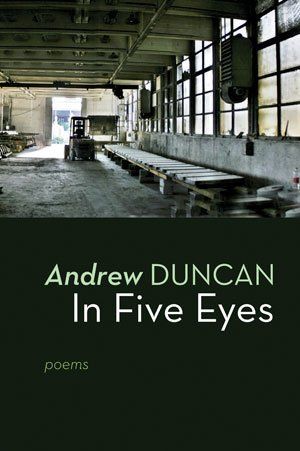
Andrew Duncan On the Margins of Great Empires — Selected Poems
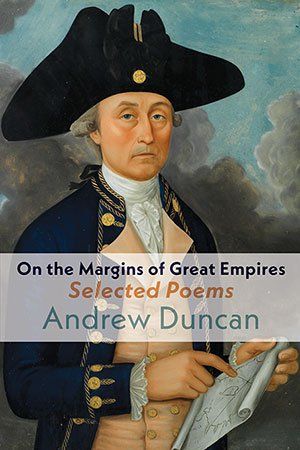
Andrew Duncan With Feathers on Glass
Published 2023. Paperback, 120pp, 9 x 6 ins, £12.95 / $20
ISBN 9781848619012 [Download a sample PDF from this book
here.]
The original idea of “paintings on glass” was to get close to folk art. After a long period attempting to learn Gaelic and Welsh, this new poetry is saturated in folklore and myth. The paintings are a distribution of cultured art motifs to rural households, patterns copied onto glass with feathers or brushes made of marten-hair. They are an expression of humility towards the illiterate. The idea of cultural difference being the effect of distribution technology was illustrated by the peddlers who carried the glass panes around the villages of central Europe. The interest in shopping follows a previous and prolonged interest in manufacturing and production, completing the sequence. Reminiscences of childhood and the wreck of the great High Street department stores around 2020 combine in a personal mythology of grand motifs and elaborate ruins.
This is a new start after a long period of silence and begins with an inventory of concrete facts around the poet, in his home in Nottingham, close to where he grew up. One theme is defeaturing, the recreation of court and metropolitan art forms in a simpler manner. Radiant messages broken up by distance. (Andrew Duncan)
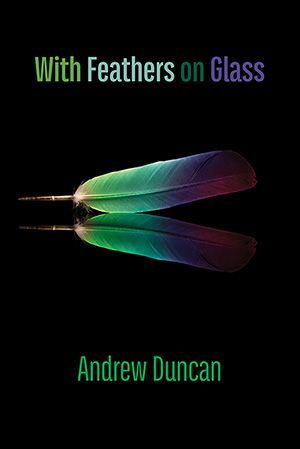
Andrew Duncan On the Margins of Great Housing Estates
Published 2025. Paperback, 108pp, 9 x 6ins, £12.95 / $20
ISBN 9781848619968
This follows a 12-year year halt, and the first product of the new phase was Feathers on Glass (2023). 'A history of shopping' was started around 2003 and falls on both sides of the gap. That series deals with exchange and retailing, as a successor to a prolonged interest in manufacturing and production. “The Goths as inventors of tourism”, deals with the legend of wealth and culture as the motive which leads barbarians from the world-periphery to surge towards the Mediterranean as if to a shopping mall. The flow of goods lifts people off their feet, is like a river of dreams. 'One absolutely perfect cultural object' describes perfection as what you can't have and which still motivates the life cultural. A poem deals with William Hallam Pegg, a Nottingham lace designer and communist who, during the Depression, produced a monumental design for an allegory of Want and Plenty, as a pattern to be realised in Jacquard lace.
In central place is the long poem 'Calendar Rite', an autobiographical sequence constructed in a double line like two banks of a river; the poem is strung out along a V where there is a hinge and poems along each arm repeat each other’s themes in an altered or defective symmetry. The speaker is faced with a cold river and has to shed every possession to get across it without being swept under. He remembers everything which must be lost, which stored heat and which generated heat. Scenes of unresolved conflict play out in a dream landscape. The rival journeys of several hundred poets are recounted as a race between so many ships, in which almost all are wrecked, their anatomies altered by terminal stresses. Past performances are recalled along with past poems, realised as chains of irrational and compulsive images. Irrational motives for symbolic action are re-voiced as the mineralisation of cherished objects, a personal museum of impassioned seizures which are models for verbal objects, moving from inside to out and surrounding the speaker. The choices infallibly leading to rejection of collective and imposed imagery make for a history of dissidence, symbolised in a tiny 5th century papyrus codex, written at millimetric scale to be easily hidden during police raids, and read with the help of a convex lens. The hidden is boundless and space vanishes into the cracks.
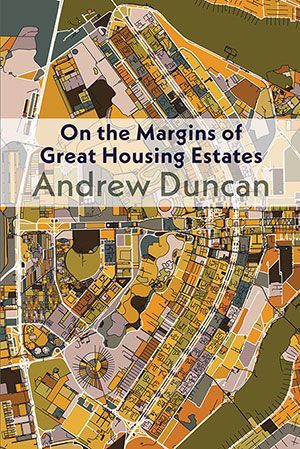
Andrew Duncan The Council of Heresy —A primer of poetry in a balkanised terrain
Published 2009. Paperback, 312pp, 9x6ins, £17.95 / $27
ISBN 9781848610071 [Download a sample PDF from this book here .]
Andrew Duncan's latest study of contemporary British poetry offers studies of some thirteen poets, together with a number of general essays giving an overview of events and trends in British poetry over the past thirty to forty years. Some of the names will surprise, others will be expected. The juxtapositions of ideas, and of names, will disturb those who are more comfortable with trench warfare than with dialogue, and Duncan's startling aperçus will leave even the most well-read student of poetry wondering.
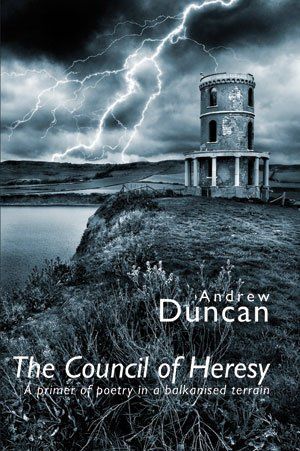
Andrew Duncan The Long 1950s
Published 2012. Paperback, 312pp, 9x6ins, £17.95 / $25
ISBN 9781848611375 [Download a PDF containing the introduction to this book here .]
"The story of poetry since 1960 is largely of people rebelling against what was there in the 1950s. But another story is about poets who didn't revolt against that, but went on with it—developing it organically. The present work deals with a complex of issues, but started with the double twist, that two 50s poets, Logue and Hill, have dominated the artistic scene over the last ten years (or, say, 1996 to 2006) and that the death of the main '50s style has liberated the official English poetry, with the decease of certain inhibitions which were glued together and brewed up to weapons grade quality back in the 1950s." —Andrew Duncan
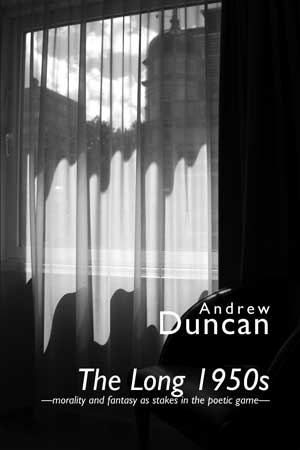
Andrew Duncan A Poetry Boom 1990-2010
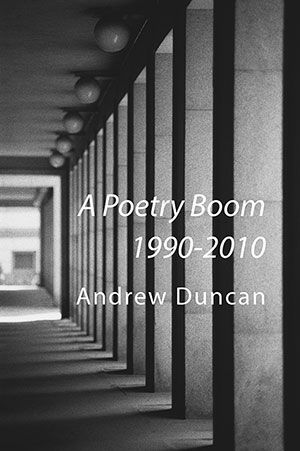
Andrew Duncan The Failure of Conservatism in Modern British Poetry (2nd, Revised Edition)
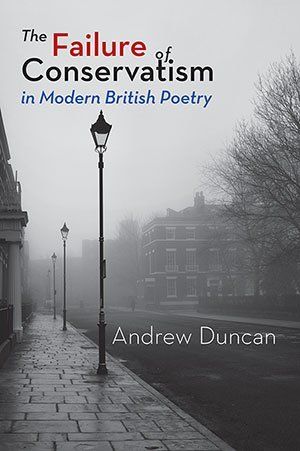
Andrew Duncan Centre and Periphery in Modern British Poetry (2nd, Revised Edition)
Published 2016. Paperback, 318pp, 9 x 6ins, £17.95 / $25
ISBN 9781848614994 [Download a sample PDF from this book here .]
Does what is true depend on where you are? Or, can we speak of a British culture which varies gradually over the 600 miles from one end of the island to the other, with currents gradually mutating and turning into their opposites as they cross such a distance? The unbalanced local energies which gave birth to the central horror of possessive individualism, the Empire, and the State as war-machine, do not sound their triumphalist self-praises without conjuring up a reaction in favour of collective values, pacifism, equity, and the languages of the periphery. Poetry has to offer more than the illusion of being in the few rooms where a metropolitan elite solemnly engages in the circularity of authentication. A polemic tour of Scotland, Wales, and the North of England exposes the possibility that the finest poets of the last 50 years have lived in the outlands, not networking and neglecting to acquire linguistic signs of status. We contemplate the sublime through the works of Sorley Maclean, Glyn Jones, Colin Simms, and Michael Haslam. But a second look at poetry in the South jettisons the shallow tricks favoured by High Street cultural managers to reveal a hidden stratum of intellectually sophisticated poets, even in Babylon.
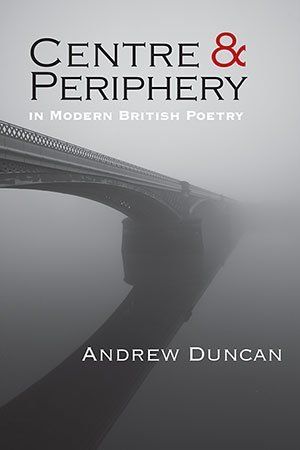
Andrew Duncan Fulfilling the Silent Rules — Inside & Outside in Modern British Poetry 1960-1997
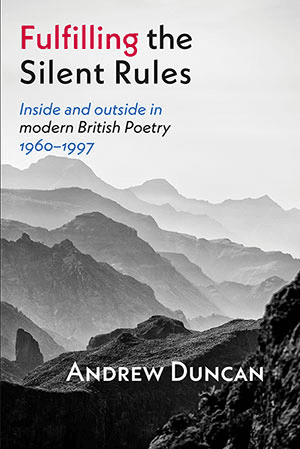
Andrew Duncan Nothing is being suppressed
Published 2022. Paperback, 328pp, 9 x 6ins, £17.95 / $25
ISBN 9781848617490 [Download a sample PDF from this book here .]
"There are several reasons for writing about the Seventies at this point. One is a reading of a recent collection of memories of the decade by participants. My impression was that they couldn’t remember the period – too much time had gone by. They had lost all sense of differentiation and were writing about 1975 as if it was 2015. It is also possible that any attitudes of the previous time which didn’t chime with current positions were being written out, consciously or unconsciously. The extent of the mismatch is of great importance, I think. This suggested that there was a real problem with memory, justifying an account based on contemporary documents. The other problem with memory is that we are living in a splinter dictatorship, a cultural phase where the forces of convergence have stacked arms and opinions are split up into small groups. How can there be a collective memory when there is no single point on which all factions agree? so how can I record collective memory? in what sense is any statement about poetry true? But this argues even more for putting facts down and increasing the area free from malicious invention. We need to think about the divergence as a phenomenon in itself, a kind of cultural gravity that guides all the watercourses. The splintering allows local freedom at most locations – what it does not allow is unifying literary opinion." — Andrew Duncan
Andrew Duncan Beautiful Feelings of Sensitive People — Screen grabs of British Poetry in the 21st C.
Published 2024. Paperback, 336pp, 9 x 6ins, £19.95 / $28
ISBN 9781848619418
The very idea of beautiful feelings makes people laugh, but surely we prefer beautiful feelings to other feelings and sensitive poets to insensitive ones. Few poets proclaim their insensitivity. All the same the phrase points to a possible lack of balance. If the focal point is sensitivity then that might restrict the world of the poem to a small zone close to the poet’s skin, with everything collective, objective, political, abstract, technical, etc., disappearing from view. Even if we accept that poetry is now subjective and egocentric, we can ask if this is an ideology, and look for external forces supporting it, for the currents of poetry which breach its rules, and for historical moments which closed off an exit into other possibilities.
The main feature of the 21st C scene is the great number of poets at work. This is a motive for writing about as many poets as possible, eighty in this case. They are only partly hidden by the details we don’t know. The field may have no overall shape but its local fabric looks like a rich differentiation into linguistic micro-climates, brought about by the sheer number of people and their interest in fine distinctions. If we stroll through enough of the new poets, we may find that sensitivity and the need to be original have shaped a landscape of diversity and achievement which excels our capacity to take it in. This is a park designed for collectors of exotic and finely wrought artistic sensations. Where realms of talent are hidden behind realms of talent, an expedition can last for years.
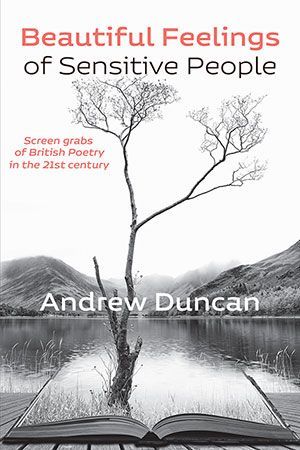
Ken Edwards Collected Poems 1975–2020
"A Collected Poems is a tombstone – there’s no getting away from that. So it was with decidedly mixed feelings that I approached this project. But it has to be said this is a good moment to pause and take stock; it’s been a while now since verse composition was central to my practice, and the work of some forty years can be looked back on with some degree of objectivity, now that I am no longer fabricating lines, but rather sentences (though there are a lot of those here too).
Ken Edwards a book with no name
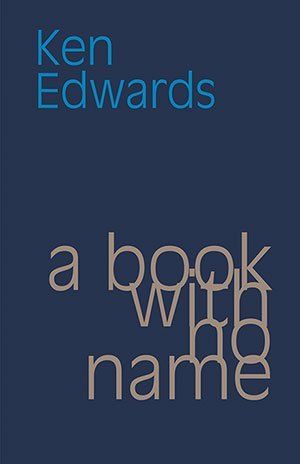
Ken Edwards Songbook
Published 2009. Paperback, 116pp, 8.5x5.5ins, £12.95 / $20
ISBN 9781848610675 [Download a sample PDF from this book here .]
This book, spanning two decades of work, contains songs that have never been and never will be sung; anti-lyric and narrative poems for which a musical equivalent has been constructed; and text written specifically for musical purposes. The volume is completed with scores composed by Elaine Edwards of settings of three poems from Ken Edwards' earlier book eight + six.

Ken Edwards No Public Language — Selected Poems 1975-1995
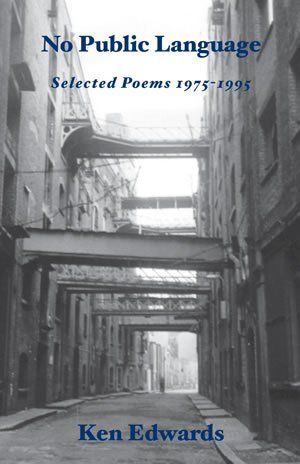
Steve Ely Jubilate Messi
Published 2018. Chapbook, 36pp, 8.5 x 5.5ins, £7.50 / $10.95
ISBN 9781848616134 [Download a sample PDF from this book here .]
I’ve played, watched and loved football all my life. Along with birds and birding it is my most enduring passion. So I thought I’d write about it. My original intention was to write a poetic history of football, from the creation to the present day. I started fluently, but one thing and another got in the way and the footballing Muse abandoned me after about twenty poems. The poems in this chapbook are those of the original twenty that made it through the selection process and got into the first eleven. Plus a sub. Messi comes last, but it is definitely not him.
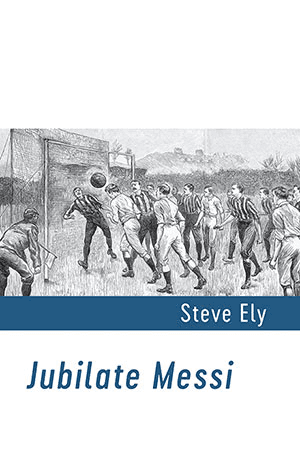
Steve Ely Lectio Violant
"The poems in this book are improvisations arising from contemplative readings of four chapters of the 1611 edition of the King James Bible—Matthew VI, Mark V, Luke XV and Luke X. Lectio Violant—‘profane reading’—is the name I’ve coined to describe this process, alluding to Lectio Divina—‘divine reading’—the long-established Catholic practice of devotional reading, the purpose of which is to draw the reader closer to God by enabling a fuller experience of scripture. I’m not sure this book’s doing the same thing, although you never know." —Steve Ely
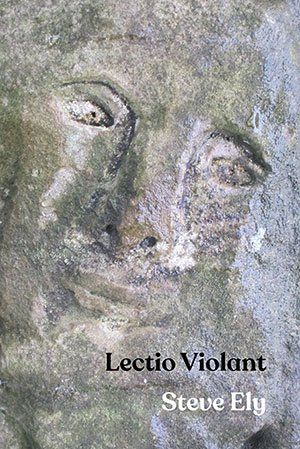
Carrie Etter (ed.) Infinite Difference : Other Poetries by UK Women Poets
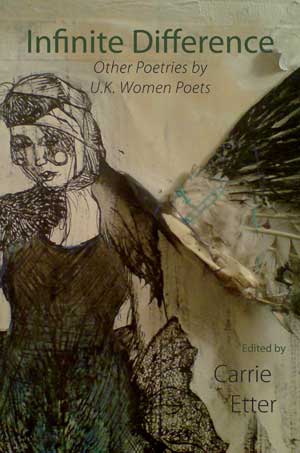
Carrie Etter Divining for Starters
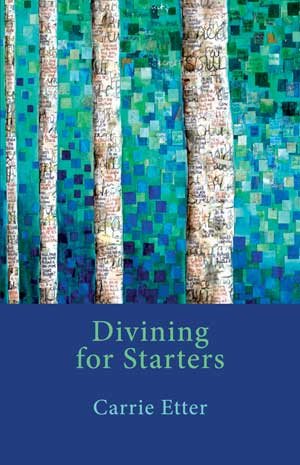
Carrie Etter Scar
Published 2016. Chapbook, 26pp, 8.5 x 5.5ins, £7.50 / $10.95
ISBN 9781848614871 [Download a sample PDF from this book here .]
In Scar , Carrie Etter compellingly explores the effects of climate change on her home state of Illinois. The language shifts and evolves painfully as the land and its inhabitants find themselves wracked by climatic and political forces beyond their control.
You can hear the author talking about Scar on a podcast from the Scottish Poetry Library here , interviewed by fellow Shearsman author, JL Williams.
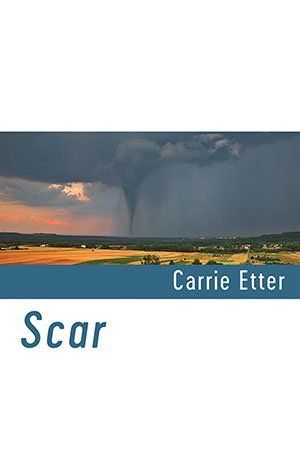
Amy Evans The Sea Quells
Published 2013. Chapbook, 36pp, 8.5x5.5ins, £7.50 / $10.95
ISBN 9781848613140 [Download a sample PDF from this book here .]
The poems in this chapbook form an individual sequence. At the same time, they present a new and longer section of an ongoing series. The Sea Quells responds to and continues Collecting Shells, which was published in 2011 with Oystercatcher Press and is included, in excerpt form, in the anthologies Sea Pie (Shearsman) and Dear World and Everyone In It (Bloodaxe).
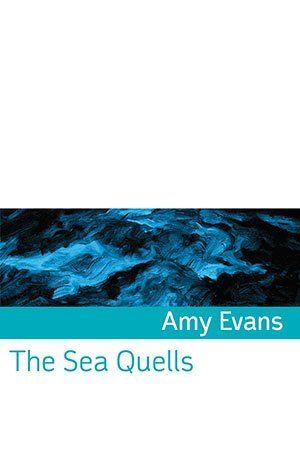
Amy Evans CONT.
Published 2015. Chapbook, 36pp, 8.5x5.5ins, £7.50 / $10.95
ISBN 978184861454-3 [Download a sample PDF from this book here .]
A sequel to 2013's Sea Quells, CONT . continues Amy Evan's explorations of language and the infinte whiteness of the page.
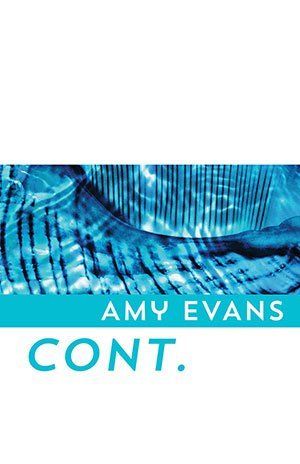
Amy Evans Bauer PASS PORT
Published 2018. Chapbook, 42pp, 8.5 x 5.5ins, £7.50 / $10.95
ISBN 9781848616226 [Download a sample PDF from this book here .]
PASS PORT is a travel document—a transcript of the first half of the at-sea installation SOUNDING((ING))S, which ‘maps’ two means of crossing one border: by sea across the English Channel, and underneath the seabed through the Channel Tunnel. Bilingual wordplay destabilises two languages used to deny refugees movement across the English-French border. The installation offers the recovery and re-appropriation of sounds from and about the body—the female body in patriarchal language, the disabled body in an age of austerity and welfare cuts, and the asylum-seeking body within the EU.
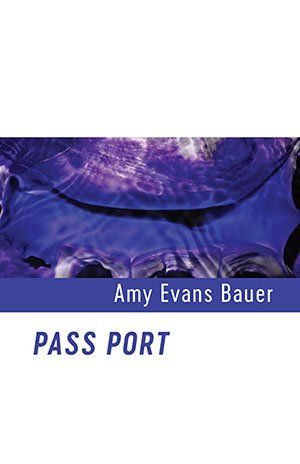
Amy Evans The Report of the Iraq Enquiry — Poetic Summary
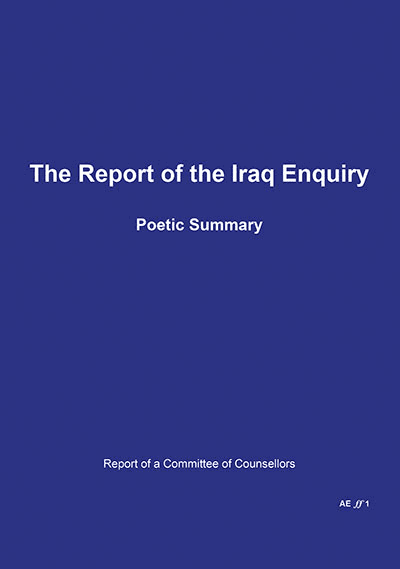
Paul Evans The Door of Taldir — Selected Poems
Edited by Robert Sheppard.
Published 2009. Paperback, 124pp, 8.5x5.5ins, £12.95 / $20
ISBN 9781848610255 [Download a sample PDF from this book here .]
Paul Evans (1945–1991) was a significant member of the group of new radical poets that appeared in England in the late 1960s, but his work remains scattered through a number of small-press publications from 1970–1987 and is now entirely out of print. This Selected Poems redresses the situation and makes available a broad selection of Evans' work from throughout his career—a career that was cut tragically short by a climbing accident.
